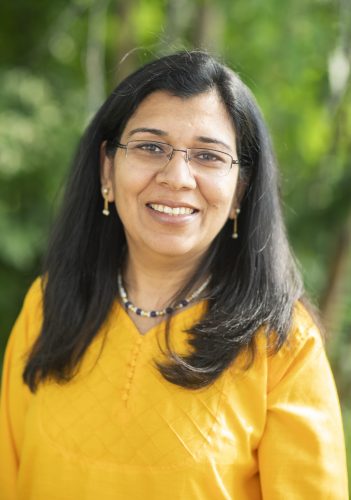Friday Focus: Care and gratitude
May 20, 2021

— by Anupma Prakash, provost and executive vice chancellor
The path we have followed or will follow in our lives is not linear, clear or preset. In fact, the course is complex, convoluted and unpredictable. For well over a year, we all have been dealing with the unanticipated turmoil a global pandemic brought to our normal way of life. We learned to adapt, adjust, readjust and move forward with resilience and hope. My family in Fairbanks found a new pattern of work-life balance, and with cautious optimism stemming from increased vaccinations, we started opening up our home and planning for vacations.
While things are on an upswing in the U.S., for many immigrants like me, the realities back home in other parts of the world are grim. In my case, India is engulfed in a second COVID-19 wave that has crumbled the medical and support infrastructure. It is not a stretch to say that every Indian or member of the Indian diaspora in the U.S. has close family members or friends in India who have suffered from the harsh toll of this second wave. This apparent dichotomy of the situation in our immediate surroundings in the U.S. and back home in India is hard to internalize for those of us who are here.
Personally, for a few weeks now, I have received a continuous barrage of messages with news of illness, death or a plea for help. Families have been on Zoom prayers with their loved ones at all hours, bonding remotely in grief and in healing. I have felt sad, angry, scared, helpless, grateful, hopeful, and beyond a certain point, just numb from the magnitude of the impact. This week I lost my father to post-COVID medical complications. I find peace and solace knowing that he received the best medical care one could hope for, and that he lived a long, rich and fulfilling life. I have immense gratitude for the medical staff and frontline workers who provided him the love and care he needed.
As I share my story, I am reminded that there are many families who are not as privileged or fortunate as we were in this situation. It is easy to take the blessings we have for granted. I have asked myself, what can I do? What can you do? Here are some thoughts:
- If you know of someone in your circles who is from another part of the world, or someone who is living by themselves away from their support network, please check on them, and be a part of their local dependable support structure.
- If you know someone who provides essential services or frontline health care, please thank them in any way you can.
- If you yourself are struggling, or know someone else who is struggling, please do reach out for help. For UAF students, the Student Health and Counseling Center is a valuable resource with trained, professional staff who are there to counsel and help. They can be reached by calling 474-7043 . Employees are eligible for free counseling through the Employee Assistance Program and can call 1-888-993-7650 anytime to make an appointment.
- If you are thinking of how best to support UAF students more broadly, please consider giving to the Student Support Fund. You can do so simply by clicking here.
My friends and family have stepped up many times to help me. I am indeed grateful for that. But this time, it was the care and kindness of people who were complete strangers to me that had a profound impact in my life. The memory of this experience will continue to inspire me deeply in the years to come.
Friday Focus is a column written by a different member of UAF’s leadership team every week. On occasion, a guest writer is invited to contribute a column.


